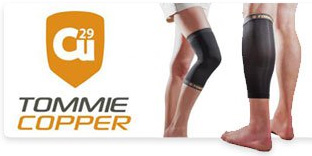Company Made Claims That Its Copper-Infused Clothing Would Relieve Pain
Washington, DC–(ENEWSPF)–December 1, 2015. Athletic apparel company Tommie Copper, Inc. and its founder have agreed to pay $1.35 million to settle Federal Trade Commission charges that they deceptively advertised the company’s copper-infused compression clothing would relieve severe and chronic pain and inflammation caused by arthritis and other diseases.
Tommie Copper’s proposed settlement with the FTC also requires the company and its founder and chairman Thomas Kallish to have competent and reliable scientific evidence before making future claims about pain relief, disease treatment, or health benefits.

Sample Tommie Copper advertisement for copper-infused compression clothing.
“It’s tempting to believe that wearing certain clothing will eliminate severe pain, but Tommie Copper didn’t have science to back its claims,” said Jessica Rich, Director of the FTC’s Bureau of Consumer Protection. “If you see an ad for a product that promises to replace the need for drugs or surgery, talk to a healthcare professional before you spend your money.”
According to the FTC’s complaint, since April 2011, Tommie Copper, based in Mt. Kisco, New York, and Kallish have advertised Tommie Copper copper-infused compression garments in infomercials, brochures, social media, and print media such as Arthritis Today magazine. The garments, including sleeves, braces, shirts and socks, range in price from $29.95 to $69.50.
The company’s infomercials featured talk show host Montel Williams declaring, “Tommie Copper truly is pain relief without a pill.” Company ads featured celebrity and consumer testimonials claiming that Tommie Copper garments alleviated pain caused by multiple sclerosis, arthritis, and fibromyalgia; and could provide pain relief comparable to, or better than, drugs or surgery. The FTC alleges that the defendants’ claims were false or unsubstantiated.
The proposed stipulated federal court order imposes an $86.8 million judgment against the defendants, which will be partially suspended upon payment of $1.35 million by the defendants. If the defendants are found to have misrepresented their financial condition, the total amount will immediately come due.
The Commission vote authorizing the staff to file the complaint and approving the proposed stipulated federal court order was 4-0. The FTC filed the complaint and proposed order in the U.S. District Court for the Southern District of New York.
NOTE: The Commission files a complaint when it has “reason to believe” that the law has been or is being violated and it appears to the Commission that a proceeding is in the public interest. Stipulated orders have the force of law when signed and entered by the District Court judge.
The Federal Trade Commission works for consumers to prevent fraudulent, deceptive, and unfair business practices and to provide information to help spot, stop, and avoid them. To file a complaint in English or Spanish, visit the FTC’s online Complaint Assistant or call 1-877-FTC-HELP (1-877-382-4357). The FTC enters complaints into Consumer Sentinel, a secure, online database available to more than 2,000 civil and criminal law enforcement agencies in the U.S. and abroad. The FTC’s website provides free information on a variety of consumer topics. Like the FTC on Facebook, follow us on Twitter, and subscribe to press releases for the latest FTC news and resources.
Source: www.ftc.gov








